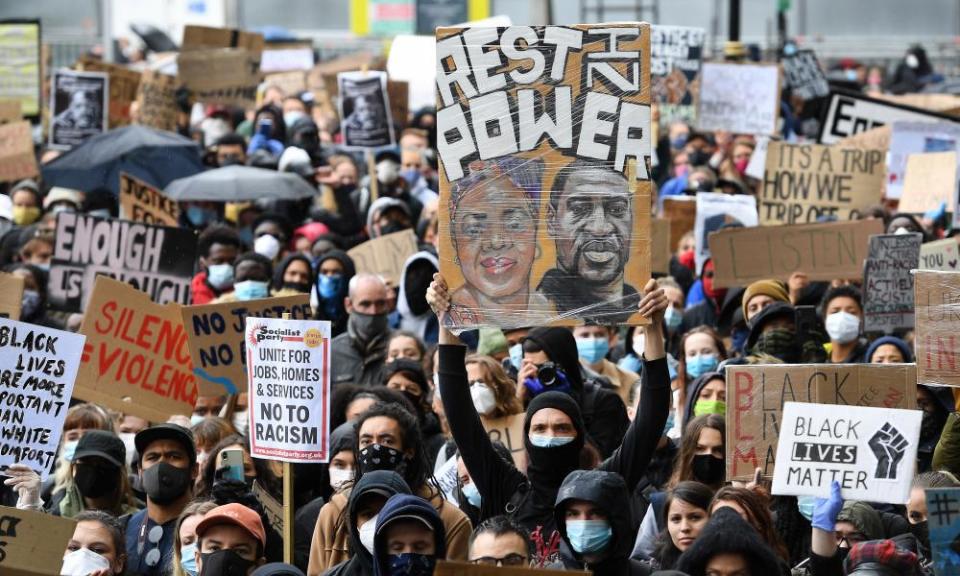UK anti-racism protesters defy calls to avoid mass gatherings

Thousands of anti-racism protesters have gathered across the UK, defying calls from ministers and police chiefs to avoid mass gatherings.
Crowds of mostly young people on Saturday heard speeches in Parliament Square, London, declaring the beginning of the end of institutional racism, and observed a minute’s silence on one knee to commemorate black people killed by police in the UK.
“Institutional racism is rooted in housing, healthcare, the education system, the media, in fashion and beauty,” Imarn Ayton, 29, told the crowd through a megaphone. “It is rooted in recruitment and employment, in politics, in policing, in immigration, and the criminal justice system.
“It is seen but you cannot see it. It is everywhere but it is nowhere … Today is the day where we say goodbye to institutional racism.”
Some demonstrators then marched to the Home Office, led by a number of drummers, to demand justice for the Windrush generation. A larger group remained in Westminster, while others converged on the US embassy, with physical distancing mostly impossible because of the depth of the crowds throughout the capital.
Holding banners reading “there is a virus greater than Covid-19 and it’s called racism” and “the UK is not innocent”. Protesters called for education at an early age about colonialism in schools and an end to the disproportionate use of stop and search as the drizzle cleared and a festival atmosphere permeated.
The UK needs to undergo a true reckoning of its colonial past, beginning with educating young people and stopping police powers being used disproportionately against people of colour, says this anonymous protester, 24 pic.twitter.com/xhndDZLxJa
— Mattha Busby (@matthabusby) June 6, 2020
“Police mentality needs to change, they need to be educated that this is not okay, stop and search is a prime example of how racist the UK is,” said a 24-year-old demonstrator who preferred to remain anonymous.
“They target black people, they target minorities, they know what they’re doing … And we need to teach children how the UK was funded by racism, [just like] America.”
Alex Kouam, 29, from west London, led chants calling for justice as a group of protesters passed Buckingham Palace.
“Evidently the UK is not innocent,” he said. “The Lammy report highlighted a number of discrepancies in the criminal justice system relating to black and minority ethnic people. But of course the government hasn’t acted upon it. This is a clear indication of institutional racism in the UK.”
The failure to swiftly implement the recommendations of the Lammy report @DavidLammy is proof of institutional racism in the UK, says Alex Kouam, 29 pic.twitter.com/Dzf8u3FRWK
— Mattha Busby (@matthabusby) June 6, 2020
There was a large police presence in London, as elsewhere, following several clashes this week between officers and a handful of protesters, and barriers outside No 10 were more robust.
A couple of officers had knelt as an act of solidarity on Wednesday, but the Metropolitan police commissioner, Cressida Dick, told officers not to do so again. As of 5.30pm the demonstration passed peacefully, though police officers outside Downing St had several plastic bottles thrown at them and were subject to taunts and jeers throughout the afternoon.
Hundreds chanted “Boris Johnson is a racist” on Whitehall, where flares were lit, and a white man made racist remarks, prompting a person to throw a drink at him. He was led away by police following a tense standoff that saw police push protesters back after one was hit in the face with a bottle.
About 15,000 people were estimated to have demonstrated in Manchester, while thousands more attended protests in Sheffield, Glasgow, Cardiff, Leicester, and Milton Keynes, and in many other towns and cities in the UK to demand an end to systemic racism and in solidarity with George Floyd, the black man who died after a white police officer knelt on his neck in Minneapolis almost a fortnight ago.
Chanting, clapping in unison and holding homemade placards saying “black lives matter”, a crowd filled Piccadilly Square in Manchester to listen to speakers. They fell silent at 1.45pm and knelt to pay their respects to Floyd.
The world heavyweight champion boxer Anthony Joshua joined the protest in his hometown of Watford.
“We can no longer sit back and remain silent on this senseless, unlawful killings and sly racism on another human being – based on what? Only their skin colour,” the 30-year-old said. “We need to speak out in peaceful demonstrations – just like today, so well done Watford. We must not use a demonstration for selfish motives and turn it into rioting and looting.”

Several hundred marchers gathered in Newcastle while thousands more watched an online protest organised in the north-east. Dr Christina Mobley, a history lecturer who came to Newcastle University from the University of Virginia in Charlottesville, attended with her five-year-old daughter.
The historian, who is leading a project to decolonise the university curriculum, said: “I absolutely felt the need to be here today. The organisers have done an amazing job. It is really powerful to see such a young, motivated crowd coming out and organising themselves, handing out masks and working with the police.”
Many wore face coverings and gloves as they ignored warnings from senior government ministers and police chiefs not to attend large gatherings over fears of coronavirus transmission.
The home secretary, Priti Patel, said on Saturday that although she understood the right to protest the UK was in the midst of a pandemic.
“I’d say to those that want to protest: please don’t,” she said, echoing the health secretary, Matt Hancock. “The regulations are very clear in terms of gatherings and mass gatherings in particular. We must put public health first at this particular time.”

 Yahoo News
Yahoo News 